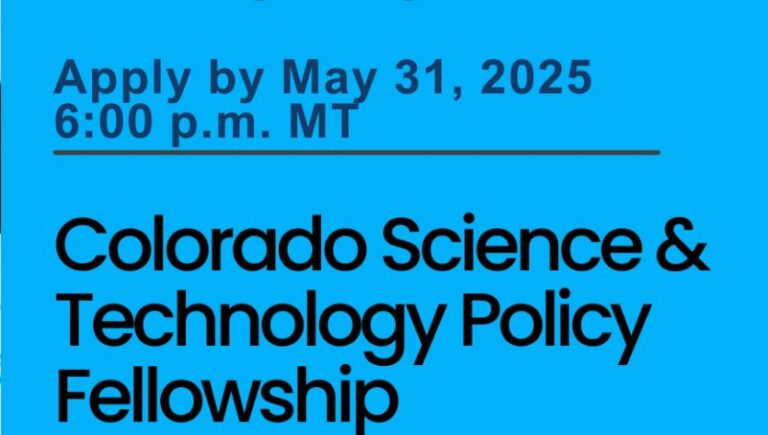Deadline: May 31, 2025
Applications are open for the Colorado Science & Technology Policy Fellowship (STPF) 2025/2026. The Colorado Science & Technology Policy Fellowship (STPF) is a nonpartisan program that places scientists, social scientists, engineers, and technical experts in support of the Colorado State Legislature for one- to two-year appointments to ensure the state’s competitiveness in science and technology.
Colorado faces a myriad of complex scientific and technological challenges, including water resources, air quality, an energy transition, advanced technology, and public health needs. Yet access to reliable scientific and technical expertise demands dedicated resources that are not always readily available to a hybrid legislature. Through the Colorado Science & Technology Policy Fellows program, they can bridge this gap and ensure that scientific information is timely and accessible.
Colorado Science & Technology Policy Fellows will work with the Colorado State Legislature, directly serving decision makers and gaining first-hand experience in state policymaking processes. Policy Fellows support the legislative branch by evaluating complex scientific issues facing Colorado while tackling the responsibilities of full-time staffers. The Fellows provide direct and continued access to nonpartisan, independent, and objective research and analysis to support evidence-based policy development.
Benefits
- The base salary will be $65,000 which is comparable to salaries provided for other postdoctoral fellowships in Colorado.
- Fellows will also receive full benefits, including health, dental, and other expenditures. Fellows are considered employees of the Denver Museum of Nature & Science.
- Fellows will also receive a $4,000 stipend for additional professional development opportunities and to cover work-related travel.
Eligibility
- Open to those with a terminal degree (Ph.D. or equivalent) in a natural science, social science, engineering, technology, or related discipline (e.g., engineering; social or behavioral sciences; medical or health sciences; biological, physical, or earth sciences; or computational sciences or mathematics).
- A master’s degree (M.S., M.E., or equivalent), plus two to three years of work experience, will also be considered. Degree completion is required before the start of the Fellowship term.
- Applicants are required to be a U.S. citizen or permanent resident eligible to work in the United States or have an applicable US work visa.
The hiring committee seeks to recruit a diverse applicant pool for the Fellowship. Minorities, women, veterans, and individuals with disabilities are encouraged to apply.
Selection Criteria
They are looking for Fellows who have the following traits to be successful in their role:
- A connection to, or interest in, Colorado and the state’s current events
- A commitment to public service and the state policy-making processes
- A capacity to be flexible and adaptable in a fast-paced environment
- Strong analytical and problem-solving skills
- The ability to deal with technical information outside one’s own specialty
- Excellent written and oral communication skills and the ability to communicate complex and technical topics with both experts and non-experts
- An appreciation for political sensitivities, and the ability to work effectively with people with a diverse range of experiences and values in a non-partisan environment
- Personal integrity and self-motivation, and the ability to manage multiple projects simultaneously
Application
Applicants will need to submit the following:
- A CV or resume.
- A cover letter outlining why you are applying to the Colorado Science & Technology Policy Fellowship, what you hope to bring to the program, and what you hope to take away, not exceed 2 pages in length.
- Two letters of recommendation submitted by your recommenders to [email protected] by May 31, 2025. Please include the subject “Colorado STPF Letter of Recommendation [applicant last name].”
The application also includes 3 short answer prompts (no more than 350 words each) to the following questions:
- Describe your research, dissertation, or thesis, as if you were presenting it to a member of the state legislature. The goal is to describe your research to a non-technical audience in a clear and concise manner that avoids using language that is overly technical.
- Give an example of how you have approached researching a topic outside of your area of expertise.
- What do you see as primary barriers to incorporating science and research into the state-level policy making process? Colorado examples encouraged.
For more information, visit Colorado Science & Technology Policy Fellowship.

